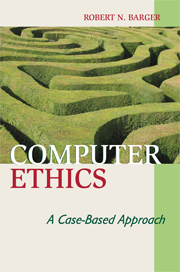Book contents
- Frontmatter
- Contents
- Preface
- Acknowledgments
- 1 Introduction
- 2 The Computer as a Humanizing Agent
- 3 Philosophic Belief Systems
- 4 A Philosophic Inventory
- 5 The Possibility of a Unifying Ethical Theory
- 6 The Ethical Decision-Making Process
- 7 Psychology and Computer Ethics
- 8 The Computing Field as a Profession
- 9 Computer-Related Codes of Ethics
- 10 Computer Ethics and International Development
- 11 Robotics and Ethics
- 12 Theft and Piracy Concerns
- 13 Cases Concerning Theft and Piracy
- 14 Privacy Concerns
- 15 Cases Concerning Privacy
- 16 Power Concerns
- 17 Cases Concerning Power
- 18 A Miscellaneous Collection of Cases
- 19 Parasitic Computing Case
- Appendix: Topics for Presentations, Discussions, and Papers
- Notes
- Selected Bibliography
- Index
3 - Philosophic Belief Systems
Published online by Cambridge University Press: 05 June 2012
- Frontmatter
- Contents
- Preface
- Acknowledgments
- 1 Introduction
- 2 The Computer as a Humanizing Agent
- 3 Philosophic Belief Systems
- 4 A Philosophic Inventory
- 5 The Possibility of a Unifying Ethical Theory
- 6 The Ethical Decision-Making Process
- 7 Psychology and Computer Ethics
- 8 The Computing Field as a Profession
- 9 Computer-Related Codes of Ethics
- 10 Computer Ethics and International Development
- 11 Robotics and Ethics
- 12 Theft and Piracy Concerns
- 13 Cases Concerning Theft and Piracy
- 14 Privacy Concerns
- 15 Cases Concerning Privacy
- 16 Power Concerns
- 17 Cases Concerning Power
- 18 A Miscellaneous Collection of Cases
- 19 Parasitic Computing Case
- Appendix: Topics for Presentations, Discussions, and Papers
- Notes
- Selected Bibliography
- Index
Summary
Introduction
Almost everyone would agree on the need for ethical standards. The problem comes in determining how those standards are to be derived. The area of philosophy known as “metaethics” is helpful in this task. However, metaethics is subject to misunderstanding. William Halverson regards metaethics as “The generic name for inquiries that have as their object the language of moral appraisal.” This definition reflects the viewpoint of a philosophy known as Philosophical Analysis. Metaethics is perhaps better conceived of as the generic name for inquiries about the source of moral judgments (i.e., about the foundation of moral judgments) and how such judgments can be justified. Taken in this sense, metaethics is not about isolated individual judgments concerning whether certain actions are right or wrong. It is about how a particular worldview – or more precisely, a weltanschauung – underlies and determines the formulation of such ethical judgments. This is an abstract way of saying, “What you think the meaning of life is, determines how you live it.”
Before one can make a judgment on whether a particular action is right or wrong, one must have adopted a weltanschauung, that is, have made an assumption that life and reality have a particular meaning. After that, one can ask whether a particular action is in harmony with one's basic understanding of the meaning of life and reality and thus one can judge whether that action is right or wrong.
- Type
- Chapter
- Information
- Computer EthicsA Case-based Approach, pp. 25 - 58Publisher: Cambridge University PressPrint publication year: 2008



